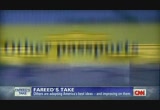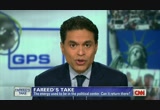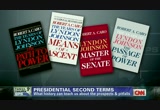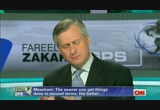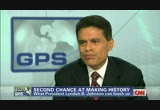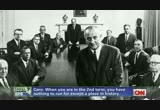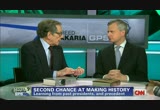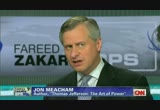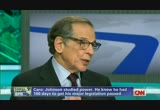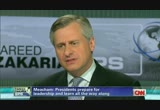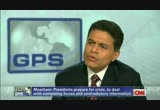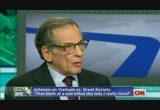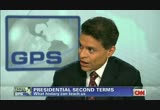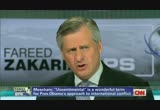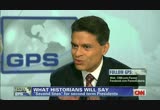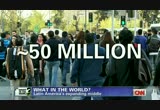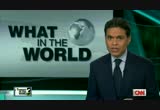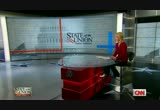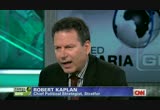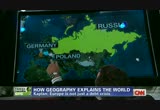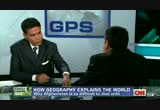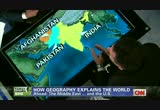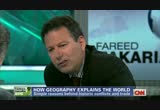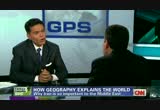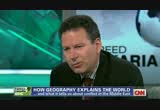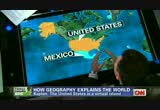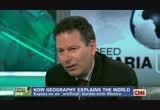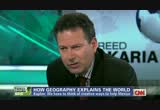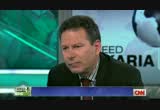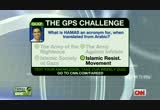tv Fareed Zakaria GPS CNN November 25, 2012 7:00am-8:00am PST
7:00 am
>> sno liebee . >> thank you so much. >> is that it? does everyone clap for us? >> i'm the only clap. thanks for watching "state of the union." i'm candy crowley in washington. head to cnn.com/sotu for analysis. look for us on itunes. "fareed zakaria gps" in next for our viewers in the united states. >> this is gps, the global public square. welcome to all of you in the united states and around the world. i'm fareed zakaria. we have a great show for you. first a rare treat. two great historians on what makes for a successful second term. jon meacham and robert carroll talk about their subjects, thomas jefferson, lyndon johnson, and a bit about barack obama as well. then the conflict in gaza yet again reminds us forget
7:01 am
about globalization and information revolution. if you want to understand the world, look at geography. nations are still bound by it, says robert kaplan, who uses maps to show us what to worry about. you won't want to miss this. and the middle class is rising. no, not here in the united states, but right next door in latin america, and it will have huge consequences for the western hemisphere and the world. also, if you thought black friday was crazy, check out the sales in europe. i'll explain. but first here's my take. it's thanksgiving weekend, america. time to reflect on our good fortune. it's also a time that most americans think about the unusual origins of the united states, a land of immigrants. we see o ourselves as special in this way, and we are, except that we're not quite as exceptional as we think anymore. something fascinating has happened over the last two decades. other countries have been transforming themselves into immigrant societies, adopting many of america's best ideas,
7:02 am
even improving on them. if you watched our immigration special back in june or read my piece in "time" magazine, you would know that canada and australia both have a higher percentage of people who are foreign born compared to the united states. in fact, on this dimension, america, which once led the world, looks like most western countries. germany and france, for example, have about the same percent of foreign-born people as america. one important difference is that many of these countries have managed to take in immigrants mostly based on skills, giving a big boost to their economies. it's not as if america doesn't need these people. american companies are struggling to fill 3.6 million job opening, many of them in science-related fields. meanwhile foreign students receive half of their doctorates in foreign fields and most all will head home after graduation. new york city mayor michael bloomberg calls it the single
7:03 am
biggest problem facing the economy and argues that our current approach is national suicide. the good news is we may finally be on the road to a solution. immigration reform has been a taboo topic for the last few years as large and vocal voices within the republican party with considerable public support have blocked any mention of reform. the words they've wanted to hear are border fence and deportation. that's why mitt romney activated a policy of self-deportation during the prisonal campaign. that's why he lost the spanish vote and asian vote to president obama by a landslide. president obama seems emboldened and the republicans chasened. so we have an opening for a deal. what should it look like? >> well, it should look like e bipartisan bond. that one did not even get to the floor of the house or senate for a vote. the right hated it because it provided a legal path for undocumented workers.
7:04 am
the left because it reduced family unification and the unions opposed the temporary worker provisions. in an earlier era, the fact that the two wings of the party disliked the bill might actually have made passage easier because the passage was in the center. today it's shifted to the wings of the political parties who control their agendas. john mccain the original sponsor of the bill now denounces his own hanley work. will it's hope in the post election atmosphere this dynamic can change and mccain can proudly support his very own bill. let me close by saying i do think america is exceptional. it is the global melding pot, a place where the universal nation is being created. we may not do better in immigration than anyone before but we do assimilation better than anyone. people from all over the world come to this country and almost magically become real americans but part of being a real american is urging the country
7:05 am
to look at its flaws and change them. let's get started. as president obama readies for a second term, i wondered who could best shed light on the challenges he faces and how to deal with them. the president is an avid student of american history so i thought it was fitting to ask two great pulitzer prize-winning historians to sit down with me. robert carroll has written four biographies and jon meacham has a new book out on a twice elected president. the book is called "thomas jefferson: the art of power." listen in on my conversation with them. gentlemen, thank you for joining me. >> thank you. >> second term, is there a historical pattern we can learn about second terms? >> well, they tend to end
7:06 am
semi-badly, as most things do with history, which i think is one of the -- the key thing to remember. people get tired. staffers leave. and so you lose some institutional memory. and as the -- second-term presidents and their congresses have two different clocks and the president's clock is now moving toward history and the longer vurk and he can take more risks. the congressional clock is still going according to the next election. and so the sooner you get things done in second term, the better because more and more the people who are also stakeholders will working toward a different set of imperatives. >> what was thomas jefferson's second term like? >> it was unhappy. >> louisiana purchase. >> louisiana purchase. he had a very good first term. the tensions with britain were enormously important in terms of the -- as ever, the foreign policy of the country, you had
7:07 am
domestic and political implications. he had a fairly disastrous economic embargo against britain. my view is that it was the least bad option before him. jefferson was sometimes seen as an overly dreamy passivist, which i don't think is true. think he was a pragmatist who didn't think the country was ready for war and so wanted to buy time and get ready. sadly, of course, that would not be the last time we were in a situation where we were unprepared for a foreign challenge. >> bob, the guy you study so carefully probably has the greatest -- the greatest swing in terms of the -- of where his second term started and where it ended. >> yes. >> why do you think that way? what was it like when he -- when johnson was elected. this is -- he had a majority in the house, a majority in the senate, and he was re-elected or elected in a landslide. not really his second term because he didn't have two elections but it was the second term of the kennedy/johnson
7:08 am
administration. >> yes. and you feel he had a sense. when you're running -- when you're in the second term, you have nothing left to run for except a place in history. and you feel johnson knows what he wants to do with the country domestically. he starts the war on poverty right at the beginning of that in what you would say his second term. he -- all his life, he's wanted to end poverty in america. he starts the war on poverty. he launches so many great society programs, medicare. so the first year, let's say, 1965 or let's say the first seven months, you say, this is a man who's going to leave his mark on history. you know, say say the moral arch bends justly but it bends slowly. i didn't say that. martin luther king says that.
7:09 am
but you really feel that johnson tries to bend it. >> what i was struck by, when you watch some of the old footage, the language johnson used was a kind of language almost no american president had never used. it was so full of idealism, it was about ending poverty, lifting up every american, providing ed kachlgts it is the most expansive domestic, you know, idealism, that i can recall any president ever having. >> you know, and people working with him could hardly believe it, like richard good win who was a speechman for kennedy and then johnson brings him on board. asks him basically about civil rights. and johnson says, you know, are e fehring to the time he was 20 years old and he was teaching the mexican/american kids in a little town in south texas, he says to goodwin, you know, i promised myself then that if ever had the power to help these kids i'm going do it.
7:10 am
now i'll tell you the secret. i have the power, and i'm going to use it. >> i think one thing bob writes so brilliantly about is johns johnson's appetite. he was always in a hurry and would also get sick he would drive himself so hard. jefferson always learned to projektd an image of calm. that was part of the ek question namety of the time. but one of the things he learned from a failure, johnson learned from teaching those kids, what jefferson learned from being a very unsuccessful wartime general from virginia is to always seize the opportunity. louisiana, when the opportunity came, he did not hesitate. he at first thought he would have to get a constitutional amendment. he didn't think he had the authority to do it. then he got a letter and suddenly the constitutional scruples went out the window.
7:11 am
one of the things that marks great leaders is the ability to know how the clock is moving and the game is playing. >> the clock is ticking even outside of vietnam and i want to get to foreign policy challenges later. even though there's that, there's beginning to be an opposition to it. >> you know what he tells us there? he says, we've got 100 days. johnson has studied power. he's studied in an intuitive way. he understands congress, and he tells his aides as this legislation is being written, hurry up. i've got 100 days. we've got 100 days and then the momentum of my election is going to start running out. >> we're going to talk about foreign policy crises and president obama's style, whether that needs to change, coming right up. [ male announcer ] citi turns 200 this year.
7:12 am
in that time there've been some good days. and some difficult ones. but, through it all, we've persevered, supporting some of the biggest ideas in modern history. so why should our anniversary matter to you? because for 200 years, we've been helping ideas move from ambition to achievement. and the next great idea could be yours. ♪ i have a cold... i took dayquil, but i still have a runny nose. [ male announcer ] truth is, dayquil doesn't work on runny noses. what? [ male announcer ] it doesn't have an antihistamine. really? [ male announcer ] really. alka-seltzer plus cold and cough fights your worst cold symptoms, plus has a fast acting antihistamine to relieve your runny nose. [ sighs ] thank you! [ male announcer ] you're welcome. that's the cold truth! [ male announcer ] alka-seltzer plus. ♪ oh what a relief it is! ♪ [ male announcer ] can't find theraflu?
7:13 am
7:15 am
at meineke i have options... like oil changes starting at $19.95. my money. my choice. my meineke. we are back with robert carroll and jon meacham, two great, great historians. jon, crises always spring up. you look at president obama and you think you know what's going to happen, but you can imagine something with iran, something with syria, something with
7:16 am
china. >> something with something we don't know. >> something with something. the unknown unknowns as donald rumsfeld would say. >> right. >> is there any way to prepare for them? what does history tell us. >> no is the short answer, except that you prepare for leadership and hopefully you learn all the way along. i think president kennedy's great example of that. i think the conventional historical wisdom about learning from the bay of pigs and the pay juf from the missile crisis is true. he was able to understand that the generals weren't always right and to wait and to always put yourself in the other guy's sho shoes, which is a hugely important lesson and all these presidents understood. so in a sense you prepare for crisis, you prepare to deal with competing forces, and also incoming and seemingly contradictory information. even in this era where the
7:17 am
president of the united states is watching in real time the operation to take out bin laden, even with that, there is a fog of war, there is a fog of information, and a president is paid to make sure that when he's acting, he's acting on facts. and i think where presidents get in trouble as president bush did, i think particularly in the first term was acting on information -- acting on convictions that were not supported by the data coming in. >> when johnson saw what a foreign policy situation was doing to his great society, did he realize then what you are saying now, which is that the whole great society was buried under the mountain that was called vietnam? >> well, he actually says that. he says this bit -- i forget the exact phrase, but this b i t it a war is going to kill the woman
7:18 am
i love, which is this great society. and what i have to say, i have to write about it and figure it out, why exactly did he go -- you know, you read the notes of some of these meetings and you say, oh, all the arguments they're saying here, they're going to deescalate, but time after time, he makes the decision to escalate until finally, you know, we're up to 586,000. i mean we talk about iraq and afghanistan today. we had 586,000 men in the jungles of vietnam. why is he going forward? you know, in the white house, then pennsylvania avenue, was not cordoned off so the protesters could come right up to the white house gates. you can hear in parts of the white house what they're chanting. they're chanting, hey, hey, lbj, how many kids did you kill today? he can hear it, his wife can hear it, his daughters can hear it, and yet he goes on.
7:19 am
it's one of the unyielding terms. why. you have to say what is the human reason for this? >> and think of obama, jon, as somebody who seems to have that internal discipline not to do that, to kind of send -- throw good money after bad. if you look at iraq, if you look at afghanistan, he's quite unsentimental and is willing to pull back despite the fact this his defense secretary gates, general petraeus, general crystal, were all against the drawdown in iraq. i have a feeling that he has a certain kind of discipline that is going to make him cautious about doing that kind of escalation. >> i think the first term with the exception of the afghan surge would totally support that. >> right. >> i think that -- >> and there as you know what happens is the generals kind of outfox him by leaking to the media that they have made a recommendation -- >> and i think historically the
7:20 am
that's the wing thing in the first term in terms of foreign policy that's going to be problematic so far for him. otherwise, i think unsentimental is a wonderful term for him. i think the drone campaign, i think the steady shift from counterinsurgency to counterterror in afghanistan is hugely important. i think, you know, his approach -- you and i have talked about this before. his approach to iran, which the right wing in merge wants to see as soft, i just -- my sense of him as a person and also based on what he's done on the war on terror is i wouldn't cross him. there's a steeliness there. he's data-driven in the way he's talked about his opponent, this year being so much of fact guy. but i do think that the president has proven his toughness, so he has less to prove in the sense of he does not need to go escalate something in order to prove his
7:21 am
manhood. he's done that. and so i think that he has more in common with kennedy probably than johnson in that sense. >> when historians write about obama, so far i think what we can say is most presidents get two lines written about them. one will be health care and the second would be the line that hasn't been written. it could be a foreign policy thing. i could be he put the united states on stable fiscal footing or, you know. it depends on one's political persuasion in what you think the second line will be. >> you know, you're running for that line. you're running for a place in history. you look at things. don't you think the president in the second term just last to in human terms look at things differently? >> absolutely. i think it's that different clock. i think it's also -- the minute of the second term curse is a
7:22 am
powerful one, and, yes, there are many powerful examples. but there's where the president went to geneva and moscow. there's a kind of liberation. the question is can the liberation of the president be synced up with the constraints of everyone else in the system who do face another election. >> yeah. >> and i think that's -- the greatest politicians are the ones who can make those two things sync up. >> jon meacham, robert carroll, great to have you. up next, what in the world. societies around the world have become more unequal. the gap between the rich and poor is uneven. where one is bucking the trend and it has important consequences. up next. tdd#: 1-800-345-2550 let's talk about your old 401(k). tdd#: 1-800-345-2550 you know, the one that's been lying around. tdd#: 1-800-345-2550 tdd#: 1-800-345-2550 rollover your old 401(k) to a schwab ira, and we'll help you tdd#: 1-800-345-2550 find new ways to make your money work harder.
7:23 am
tdd#: 1-800-345-2550 so if you're ready to teach your old 401(k) some new tricks... tdd#: 1-800-345-2550 tdd#: 1-800-345-2550 talk to chuck. tdd#: 1-800-345-2550 rollover your old 401(k) tdd#: 1-800-345-2550 to a schwab ira tdd#: 1-800-345-2550 and you can receive up to $600. tdd#: 1-800-345-2550 see schwab.com tdd#: 1-800-345-2550 for terms and conditions. tdd#: 1-800-345-2550 call, click or visit tdd#: 1-800-345-2550 to open an account today. good boy. starts with arthritis pain and a choice. take tylenol or take aleve, the #1 recommended pain reliever by orthopedic doctors. just two aleve can keep pain away all day. back to the news. who have used androgel 1%, there's big news. presenting androgel 1.62%. both are used to treat men with low testosterone. androgel 1.62% is from the makers of the number one prescribed testosterone replacement therapy. it raises your testosterone levels, and... is concentrated, so you could use less gel. and with androgel 1.62%,
7:24 am
you can save on your monthly prescription. [ male announcer ] dosing and application sites between these products differ. women and children should avoid contact with application sites. discontinue androgel and call your doctor if you see unexpected signs of early puberty in a child, or, signs in a woman which may include changes in body hair or a large increase in acne, possibly due to accidental exposure. men with breast cancer or who have or might have prostate cancer, and women who are, or may become pregnant or are breast feeding should not use androgel. serious side effects include worsening of an enlarged prostate, possible increased risk of prostate cancer, lower sperm count, swelling of ankles, feet, or body, enlarged or painful breasts, problems breathing during sleep, and blood clots in the legs. tell your doctor about your medical conditions and medications, especially insulin, corticosteroids, or medicines to decrease blood clotting. talk to your doctor today about androgel 1.62% so you can use less gel. log on now to androgeloffer.com and you could pay as little as ten dollars a month for androgel 1.62%. what are you waiting for?
7:25 am
this is big news. britta olsen is my patient. i spend long hours with her checking her heart rate, administering her medication, and just making her comfortable. one night britta told me about a tradition in denmark, "when a person dies," she said, "someone must open the window so the soul can depart." i smiled and squeezed her hand. "not tonight, britta. not tonight." [ female announcer ] to nurses everywhere, thank you, from johnson & johnson.
7:27 am
now for our "what in the world" segment. with pennsylvania's visit to asia and the farn war in ghanaian, our focus has been on the far east and the middle east, but let's not forget the surprising developments in the region we share a 2,000-mile border with, latin america. i just read a new world bank report. yeah, that is what i do in my spare time -- and it has some important findings. between the years 2003 and 2009, nearly 50 million people joined latin america's middle class. that's twice the entire population of the state of texas and the sixth of america's population as a whole. in those six years, the size of the region's middle class expanded by 50%. the proportion of people in poverty fell sharply from 44% to 30%. and as the rest of the world became more unequal, latin america was the only region to decrease the gap between rich and poor.
7:28 am
the findings have important consequences locally, but also for the world. when china lifted hundreds of millions of people out of poverty in the 1980s, it set out on a path toward increased consumption and glowing global clout. is latin america headed the same way? let's take a look. the world bank cites a number of reasons behind the region's rise. 70 million women joined the labor market in recent years contributing to a reduction in extreme poverty. education boosted poverty. they spend three years more in school than a decade ago thanks to targeted initiatives. of course, there's been a rise in exports. brazil has enjoyed a rapid growth fueled by commodities. the question is whether the rise is sustainable. the world bank cautions that class remains a major opportunity to latin america. you are likely to spend the same
7:29 am
number of years in school as your parents. the economist points out that the difference in the quality of school ace tended by those at the top and bottom income groups is bigger than anywhere else in the world. the growth of a latin america meddle class is obviously good news but there's reason to worry about its economic future. wre cently reported how brazil's growth rate closely tracked the dmod prices. if those prices drop as a result of a slowdown in china and europe as many economists expect, brazil and latin america's grouktd will stall. that could mean new entrance to the middle class may slip back into poverty. that night to be diversified. the many closed sectors and markets across the region need to open up further and foster competition. but how will these governments raise money? this is where latin america is different from china in the 1980s. too many entitlements and
7:30 am
subsidies have been doled out. argentina, for example, has put in place a noncon trib tout pension scream, essentially free support for the elderly. what happens when it's time to pay up? apart from brazil and argentina, taxes are low across the region. how do you increase them. as we all know in the united states, entitlements once given are hard to take back. it's hard to read about those who climb out of poverty. but latin america faces challenge to sustain these gains, otherwise we could look back on this period as a peak from which it fell. up next we tend to think of international politics as a complicated science. my next guest says it's actually quite simple and it pertains to a subject we've all been taught about in school. i'll explain. ♪ announcing the all-new 2013 malibu from chevrolet. ♪ with a remarkable new interior featuring the available
7:31 am
chevrolet mylink infotainment system. this is where sophisticated styling begins. and where it ends? that's up to you. it's here -- the greatest malibu ever. ♪ [ nyquil bottle ] just reading your label. wait...you relieve nasal congestion? sure don't you? [ nyquil bottle ] dude! [ female announcer ] tylenol® cold multi-symptom nighttime relieves nasal congestion. nyquil® cold and flu doesn't. anyone have occasional constipation, diarrhea, gas, bloating? yeah. one phillips' colon health probiotic cap each day helps defend against these digestive issues with three strains of good bacteria. approved! [ female announcer ] live the regular life. phillips'.
7:32 am
7:34 am
i'm dana bash in washington with a check of the headlines. protesters and security forces clashed again today in tahrir square as recenters protest over what they consider a power grab. morsi announced late last week that egyptian courts could not overturn any law he has issued since taking power in june. opposition protesters have called for a sit-in in tahir jair while the muslim brotherhood said they will stage nationwide demonstrations in support of morsi's plans. as the truce holds between hamas and israel for if fourth day, president mahmoud abbas is
7:35 am
confident. palestinian factions are supporting the effort but the others are opposing it. finally lotto fever. lottery officials say there were no winners in last night's power lottery pushing this week's jackpot to under $425 million. that's the largest jackpot ever for the game. those are your top stories. now back to "fareed zakaria gps." we live in a borderless world, right, where globalization, inper dependence, and economics are reshaping the way companies and countries cooperate. not quite, says robert kaplan. he's written a book called "the revenge of geography: what the map tells us about coming conflicts and the battle of
7:36 am
flight." >> he joins me now. you have this terrific book out. explain what the premise is. mine i tried to very briefly do it. >> yeah, the premise is that in all the journals of opinion, all the op-ed pages, it's all about what we can do. we can intervene here. we can change interest rates there. there's lieu ma ee's human agen. there's nothing human beings can't overcomfy only we had the right policy. this takes the other 50% of reality. it's about constraints. it about what we operate. a good part of those are geographical. >> let dees this practically. let's take a look at a map. you tell me what you see. when we look at europe, we tend to think of this big global economy, a borderless society, and you look at this map and you look at europe and russia.
7:37 am
>> yes. europe is not just a debt crisis. we've been narcissistically focusing on a debt crisis. it's the western extrim city of the super continent and most changes in europe over the mill len ya have come from the east. they've come from the influx of peoples throughout the east. and we thought we had defeated that with the end of the cold war, that russia was out of it. but that's not the case. precisely because this belt of countries from estonia to bull gary are right next door to russia. russia will continue to be a factor in europe's evolution. if you look at russia, it's half the longitudes of the world but it's got less people than ban ga desh. it's been invaded by poles, electricity yanians, swedes. so russia still requires buffer zones in eastern europe and the caucuses. vladimir putin is not the
7:38 am
totalitarian eastern giant the western union paints him as. his ne-yo imperialism is a function of his jeep geographical insecurity. poland, here in blue, may emerge as the real pivot state because, again, there's geography. poland has a lot of shale gas underground. poland may emerge as an energy giant in the 21st century which will give it leverage against germany and russia. >> let's move to the indian sub continent whoochlt i is afghanistan proving so difficult to deal with? why is the u.s. a decade into the war unable to go on patrol with afghans? >> one of the reasons is geographical. if you look at this relief map here, the border between afgh afghanistan and pakistan is very artificial. i've crossed the border many times. every time illegally. and the mountains that descend from the high table land of
7:39 am
central asia to the steamy in this river valley, it's a very gradual descent. it's the same indough-islamic civilization on both sides of the border. so the sides that the u.s. military and diplomatic core is going to make two separate well functioning states out of it is somewhat adverse to geology. >> what's really going on, we tlinch are good guys and bad guys but there are guys the pakistans supports, the guys that india has sup pored, the russia has intended -- >> india is a big player here, fareed. because if you look through indian history from the guptas to the mull rans, the moguls, the dynasty, others, what you see is for many periods of indian history or sub continent history, the same empire that controlled the northern third of india also controlled most of pakistan and half of afghanistan, so afghanistan is
7:40 am
not foreign to india. it's part of the sub continental conflict system. so we can leave afghanistan, the u.s. can. but understooindia, you will al deep equities there and if we desert afghan precipitously, you might see india moving closer diplomatically to russia in order to contain things there, in order to make sure afghanistan does not become just a radical islamic extension of pakistani isi control. >> so we are on track in the united states to withdraw from afghanistan over the next two years. tell us what -- what emerges as we with draw? >> what emerges is that iran will have much grader influence in western afghanistan. it's already supplying the western part of the country with electricity. it's becoming a part of greater iran.
7:41 am
you'd expect to see greater pakistani influence. remember, groups like the haqqani group are just -- they're basically like the groups that did trade in earlier times. you know, they're based in the demographic ink blot of pakistan, which, you know, is very populated. and it extends its lines of communications and influence out through the valleys all the way up to soviet -- former soviet central asia. all of them all try to expert influence there. >> that was a look at how geography plays a crucial role in europe and south asia. when we come back, it gets even more interesting. insights into the middle east and even the united states of america. right back. announcer ] choose the same brand your mom trusted for you. children's tylenol, the #1 brand of pain and fever relief recommended by pediatricians
7:42 am
and used by moms decade after decade. pretty sweet, huh? cute. but don't you have any apps on your phone that can make your life easier? who do you think i am, quicken loans? at quicken loans, we'll provide you with myql mobile. this amazingly useful app allows you to take pictures of your mortgage documents using an iphone or android smart phone... so you can easily send them to us. one more way quicken loans is engineered to amaze. ooh, la-la! there's natural gas under my town. it's a game changer. ♪ it means cleaner, cheaper american-made energy. but we've got to be careful how we get it. design the wells to be safe. thousands of jobs. use the most advanced technology to protect our water. billions in the economy. at chevron, if we can't do it right, we won't do it at all. we've got to think long term. we've got to think long term.
7:43 am
♪ so why exactly should that be of any interest to you? well, in that time there've been some good days. and some difficult ones. but, through it all, we've persevered, supporting some of the biggest ideas in modern history. like the transatlantic cable that connected continents. and the panama canal that made our world a smaller place. we supported the marshall plan that helped europe regain its strength. and pioneered the atm, so you can get cash when you want it. it's been our privilege to back ideas like these, and the leaders behind them. so why should our anniversary matter to you? because for 200 years, we've been helping people and their ideas move from ambition to achievement. and the next great idea could be yours.
7:44 am
♪ ♪ ooh baby, can i do for you today? ♪ [ female announcer ] need help keeping your digestive balance? align can help. only align has bifantis, a patented probiotic that naturally helps maintain your digestive balance. try align to help retain a balanced digestive system. try the #1 gastroenterologist recommended probiotic. align.
7:46 am
i want to take you back now to my conversation with robert kaplan, the author of "the revenge of geography." the reality is quite different. listen in and look at these maps. >> all right. now we're going to go -- now we're going to look at the middle east. >> yes. >> and you're going to explain to me why iran really is the pivot of the middle east in your opinion. >> yes. persia wasn't the world's first super power, remember, in antiquity where in saudi arabia you have a king domt ruled by a family that is not synonymous with the arabian peninsula, yemen and all these states. syria is a yugoslav sector with sectarian interests. libya is a vague geographical expression between aaa ten ya in the northwest that has always
7:47 am
been oriented toward greater carthage and tunisia and benghazi and others in the northeast which has been toward alexandria. but iran is natural as a state, it's developed rich institutions and bureaucracies over the centuries, and therefore it can project power. there will always be an iranian state. syria can collapse, libya can collapse. iran may go through regime change, but they'll always be a strong persian state. >> what does that tell you about u.s. policy toward iran? >> what it tells me is that our grand strategy has to be how do we engage in a dialogue with iran. what is the path toward that. is it fighting a war with them over nuclear weapons? is it not fighting a war with them? but the endgame is a dialogue with what is probably the most significant state in the middle
7:48 am
east where we have a lot of interests to discuss. >> so the middle east you're describing is really one where the states that are real and enduring, iran, egypt. >> tunisia. >> turkey to a certain extent. >> absolutely, turkey,y. >> those are the six -- >> because they're age-old clusters of civilization with natural borders. countries like algeria, syria, libya, jordan, were never really thought of until states until the 20 ts century. >> someone once described them as tribes with flags. >> yes. yemen is a mixed bag. even the turks and the british
7:49 am
were never able to influence their influence deep into the interior. >> all right. let's look at place where we should know more about the geography, but we don't, which is mexico and the united states. >> yes. >> when you look at this map, what do you see. >> >> whoo i see is the united states is a virtual island. canada's just a thin band of middle class civilization. 33 million people living within a hundred miles of the u.s. border. the united states's real geographic challenge is to the south where much of the border is artificial. where south of the border, you have a country that's so much poorer than the u.s. that the difference in living standards is one of the greatest in the world, you know, except for maybe that between north and south korea. mexico has a much higher population growth. the average american is in his
7:50 am
late 30s. so you have lat inhistory moving noncht that's the real drama going on in the united states. >> but you said something which i thought was interesting. a weak and artificial border between the u.s. and mexico. >> well, there's the rio grande during part of it. it's very narrow actually. and here, these were just lines drawn in the sand. remember. you have an artificial border between a very well developed civilization and one that's relatively less developed. it doesn't stay static. the border situation will always evolve in the weaker society's favor because the weaker society will eventually overcome the stronger one through immigration, through just population movements. and so the fate of mexico is as important to the u.s. as u.s. bilateral relations with china as whatever happens in the greater middle east. it's on the same category of importance. >> what should we do? >> what we should do is first of
7:51 am
all we have to revise our immigration laws. you know, that's number one. number two. our top policy makes have to spend more time on the problem. to think or manufacture creative ways to help the mexicans. it's a very dynamic economy. it's become one of the top dozen. on the other hand the northern third of it is increasingly controlled by drug cartels. there's 50,000 people that have been killed in mexico since 2006 and the reason the violence rate has dropped recently is only because the cartels are consolidating their geographic hold. so what we have to do is come up with more creative ways to help the mexicans because we cannot do it overtly because our history with mexico with invading it and such is that the sensitivities are incredible. so it has to be very, very subtle. you know, our policy makers care
7:52 am
about china, they care about the greater middle east, but mexico is relegated by the knowledge elite to a minor problem and what i'm arguing in this book is it's not. it's a major problem. >> and you're saying if we don't help mexico essentially come up to roughly the standards -- >> that has to be our goal, to make mexico as rich as we are. >> because otherwise -- >> right. and it's not that we can save mexico. mexico can help itself, but there are things we can do. >> robert kaplan, pleasure as always. >> thank you, fareed. >> and we will be right back. oh no, not a migraine now. try this... bayer? this isn't just a headache. trust me, this is new bayer migraine. [ male announcer ] it's the power of aspirin plus more in a triple action formula to relieve your tough migraines. new bayer migraine formula. i am probably going to the gas station about once a month. last time i was at a gas station
7:53 am
was about...i would say... two months ago. i very rarely put gas in my chevy volt. i go to the gas station such a small amount that i forget how to put gas in my car. [ male announcer ] and it's not just these owners giving the volt high praise. volt received the j.d. power and associates appeal award two years in a row. ♪ who have used androgel 1%, there's big news. presenting androgel 1.62%. both are used to treat men with low testosterone. androgel 1.62% is from the makers of the number one prescribed testosterone replacement therapy. it raises your testosterone levels, and... is concentrated, so you could use less gel.
7:54 am
and with androgel 1.62%, you can save on your monthly prescription. [ male announcer ] dosing and application sites between these products differ. women and children should avoid contact with application sites. discontinue androgel and call your doctor if you see unexpected signs of early puberty in a child, or, signs in a woman which may include changes in body hair or a large increase in acne, possibly due to accidental exposure. men with breast cancer or who have or might have prostate cancer, and women who are, or may become pregnant or are breast feeding should not use androgel. serious side effects include worsening of an enlarged prostate, possible increased risk of prostate cancer, lower sperm count, swelling of ankles, feet, or body, enlarged or painful breasts, problems breathing during sleep, and blood clots in the legs. tell your doctor about your medical conditions and medications, especially insulin, corticosteroids, or medicines to decrease blood clotting. talk to your doctor today about androgel 1.62% so you can use less gel. log on now to androgeloffer.com and you could pay as little as ten dollars a month for androgel 1.62%.
7:55 am
what are you waiting for? this is big news. what are you waiting for? you see us, at the start of the day. on the company phone list that's a few names longer. you see us bank on busier highways. on once empty fields. everyday you see all the ways all of us at us bank are helping grow our economy. lending more so companies and communities can expand, grow stronger and get back to work. everyday you see all of us serving you, around the country, around the corner. us bank.
7:57 am
the week began with volleys of rockets and missiles between defense forces and hamas people in gaza. that's my question of the week. what is hamas an acronym for when translated from arabic? stay tuned and we'll tell you the correct answer. go to cnn.com/fareed for more of the challenge for more insight and challenge. you can also follow us on facebook and twitter. remember, if you miss a show, go to itunes.com/fareed. you can get the ipod for free or buy the video version. the beak of the week is kwpz "thomas jefferson condition the
7:58 am
art of power." it's an admiring portrait of a politician and wonderfully written and now for the last look. judge big the bewildering buying spree on black friday, i think it's safe to say that the u.s. economy is moving forward, but the eurozone is officially in a double-dip recession, and therefore is a victim of falling tax revenues. so governments need to find new sources of revenue. what to do. sell stuff. in italy they were selling everything but the church. now they are selling the church sort of. for about $125,000, you can have your name engraved on one of the 135 splen did spires of milan's main cathedral. in spain you may soon be able to buy a res donecy permit. if you had your eye on a beach house or a pea ada tear home.
7:59 am
good news. residentially will come gra it is. and if proposed legislation passes in hungary, you can do one better there. the plan is for citizen ship and an eu passport to be given to anyone who buys hungarian bonds worth $325,000 or more. an eu passport, euro reese fire-sale is putting black friday to shame. the challenge was was d. it stands for the islamic resistance movement. ironically in its erlg years it tolerated and even encouraged hamas because it saw it action a counter weight to what was then its real enemy. today israel battles it and the u.s. labels it an fto, foreign terrorist org nachlgs another fto is a group responsible
236 Views
IN COLLECTIONS
CNN (San Francisco) Television Archive
Television Archive  Television Archive News Search Service
Television Archive News Search Service  The Chin Grimes TV News Archive
The Chin Grimes TV News Archive 
Uploaded by TV Archive on

 Live Music Archive
Live Music Archive Librivox Free Audio
Librivox Free Audio Metropolitan Museum
Metropolitan Museum Cleveland Museum of Art
Cleveland Museum of Art Internet Arcade
Internet Arcade Console Living Room
Console Living Room Books to Borrow
Books to Borrow Open Library
Open Library TV News
TV News Understanding 9/11
Understanding 9/11

